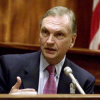Park Dietz

Park Dietz
Park Dietzis a forensic psychiatrist who has consulted or testified in many of the highest profile US criminal cases including Joel Rifkin, Arthur Shawcross, Jeffrey Dahmer, The Unabomber, Richard Kuklinski, the Beltway sniper attacks, and Jared Lee Loughner. He came to national prominence in 1982 during his five days of testimony as the prosecution’s expert witness in the trial of John Hinckley, Jr., for his attempted assassination of President Reagan on March 30, 1981. Then an assistant professor of psychiatry...